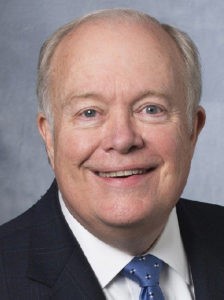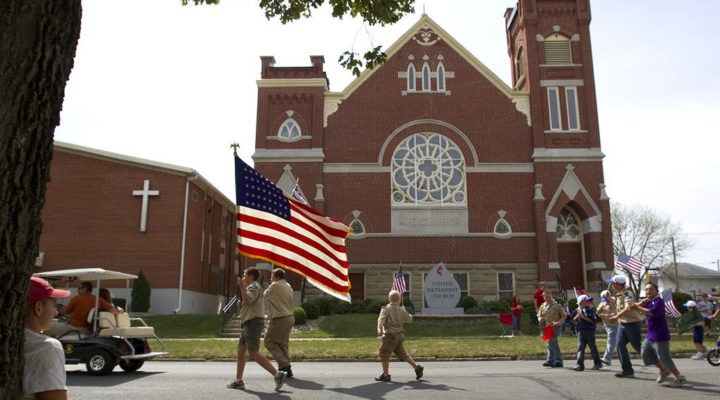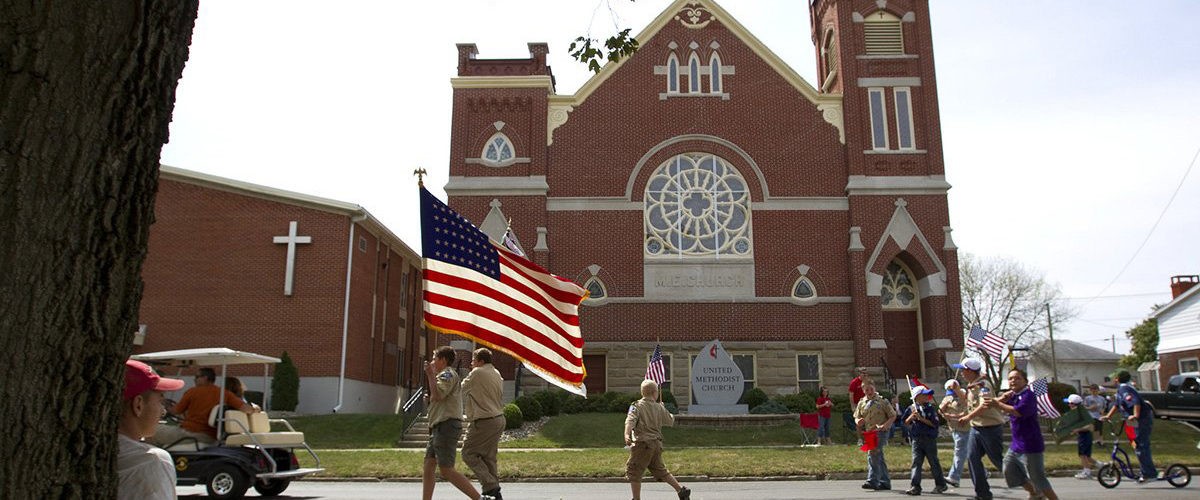United Methodist churches across the United States are being instructed to reject the proposed sexual abuse settlement plan that is part of the Boy Scouts of America’s Chapter 11 bankruptcy proceedings.
In a series of hurried meetings, the governing boards of local congregations known as “charges” are being instructed by denominational officials to vote against the BSA plan. According to leaders of the Dallas-based North Texas Annual Conference, the rejection comes after months of confidential negotiations with BSA by 100 church attorneys and treasurers.
In one such North Texas meeting, Bishop Michael McKee told leaders of the region’s 80-church Metro District that the rejection was being pushed for two reasons:
- Insufficient recompense for the survivors of past sexual abuse by BSA leaders.
- Increased liability for United Methodist congregations that have sponsored Scout troops, past and present.
In addition, said Bishop McKee, the UMC was up against a Dec. 14 deadline for filing a legal response to the bankruptcy plan, which is scheduled to come before a federal judge before the end of the year.
“You don’t want this plan to pass because it would mean increased liability for your church.”
“You don’t want this plan to pass because it would mean increased liability for your church,” Bishop McKee said at one point.
Negotiation details withheld
Citing instructions from the judge in the BSA bankruptcy case, Bishop McKee repeatedly declined to answer local churches’ requests for details. He said he couldn’t reveal specifics about the UMC’s negotiations with the BSA for reasons of confidentiality.
BSA filed for Chapter 11 bankruptcy in February 2020. Under federal bankruptcy law, a Chapter 11 proceeding is a “reorganization,” in which the plaintiff proposes to pay off its financial liabilities according to a partition set out in its plan. Some claimants receive 100% of their claims, while others receive less. BSA has proposed an $850 million settlement which doesn’t include local United Methodist congregations that sponsor Scout troops, known as “chartering organizations.” In response to a local church’s question, Bishop McKee said the UMC has no part in determining the amount of victim settlement nor which claims are authentic.

Bishop Michael McKee
The bishop, who serves as president of the church-wide General Council on Finance and Administration, tried to reassure fearful and frustrated congregational leaders that the church’s negotiators think rejecting the BSA plan is in the best interests of both sexual abuse victims and The United Methodist Church. He also said that no individual church leader was being held liable unless a sexual assault claim was filed against him or her. Nonetheless, several church leaders expressed reluctance to sign onto a murky legal response that one lay leader termed “a pig in a poke” because details were withheld.
Bishop McKee said 80,000 sexual abuse claims currently are lodged against BSA. The United Methodist Church is the nation’s largest sponsor of Scout troops, with about 10,000 local congregations having served as chartering organizations over the period of abuse, stretching back to 1940, set out in the settlement plan. The bishop said that of the 80,000 claims, 72 have been lodged against alleged perpetrators in BSA troops sponsored by United Methodist churches in North Texas.
United Methodist Men oversees the denomination’s Scouting ministries. As of 2020, UM Men reported about 3,000 United Methodist churches have chartered upward of 9,000 Scouting units, serving 300,000 children and youths, according to a UM News article by Sam Hodges. Those numbers are down from earlier years because of the decline of BSA members.
The second-largest church sponsor of Scouting, the Church of Jesus Christ of Latter-day Saints (Mormons), severed its ties with BSA some time earlier, after the organization agreed to accept gay boys as Scouts and gay men as Scouting leaders.
The dispute between The United Methodist Church and Boy Scouts of America broke open in October 2020 when church leaders filed a “proof of claim” document in the bankruptcy proceeding. That filing gave the UMC the legal status of a creditor rather than a liable organization.
Relations worsened in summer
Relations between the two giant institutions worsened over the summer when UMC negotiators learned that the 12-million-member worldwide denomination had been left off BSA’s liability insurance, leaving the UMC’s Scout-sponsoring churches vulnerable to lawsuits from victims who had been sexually assaulted on church property by Scouting leaders who may or may not have been church members.
Relations between the two giant institutions worsened over the summer when UMC negotiators learned that the 12-million-member worldwide denomination had been left off BSA’s liability insurance.
Although each congregation typically has 10 to 30 or more volunteer leaders, each local church will cast only one ballot in the bankruptcy proceedings, but that vote must be authorized by local leaders according to church law. Even with each church casting only one official ballot, Bishop McKee said, rejection of the BSA settlement plan by a majority of the 10,000 United Methodist churches involved should be sufficient to get the judge’s attention and force more negotiations.
Church leaders’ fear of greater legal liability for United Methodist congregations was evident during discussion of the rejection. Bishop McKee said that another factor in the push for a quick vote was the reality that many states have done away with time limits on sexual abuse claims because so many of the victims are children when the abuse occurs and can’t recognize or won’t disclose the crimes until they are adults.
The soured relationship between the UMC and BSA was evident from Bishop McKee’s remarks. He castigated a local Scouting council for disseminating inaccurate information regarding the bankruptcy proceedings to North Texas churches. He also chastised the BSA, based in the Dallas suburb of Irving, Texas, for failing to comply with the UMC’s “Ministry Safe” policies intended to protect children and youths from abuse.
In an August press release about the bankruptcy, BSA stated: “Throughout its ongoing financial restructuring process, the BSA has been focused on ensuring that chartered partners are fairly represented and that they can continue to support scouting.”
Bishop McKee said church-wide officials have not yet broached the subject of the UMC’s future relationship with Scouting. The movement has been a part of local Methodist churches’ youth programs for a century, but in August churches were advised not to renew their charters because of the bankruptcy liability. Instead, churches were instructed to execute “facilities use agreements” that exempt congregations from liability related to Scouting activities.
The full results of the hurried rejection votes won’t be known until the bankruptcy judge rules on the proposed BSA settlement, Bishop McKee said. “It’s not a public record until the judge rules.”
Cynthia B. Astle serves as editor of United Methodist Insight, which she founded in 2011.
Related articles:
Why churches that ever have chartered a Boy Scout troop need to pay attention right now


